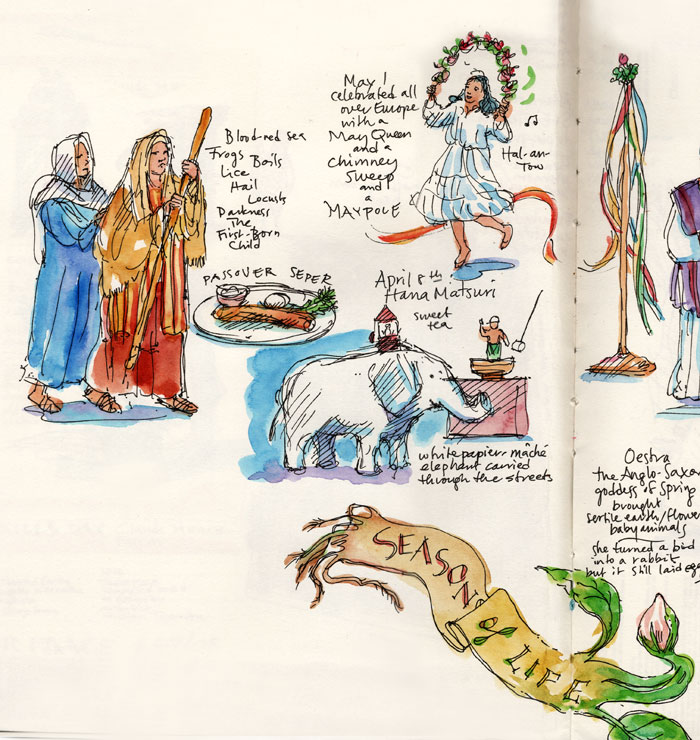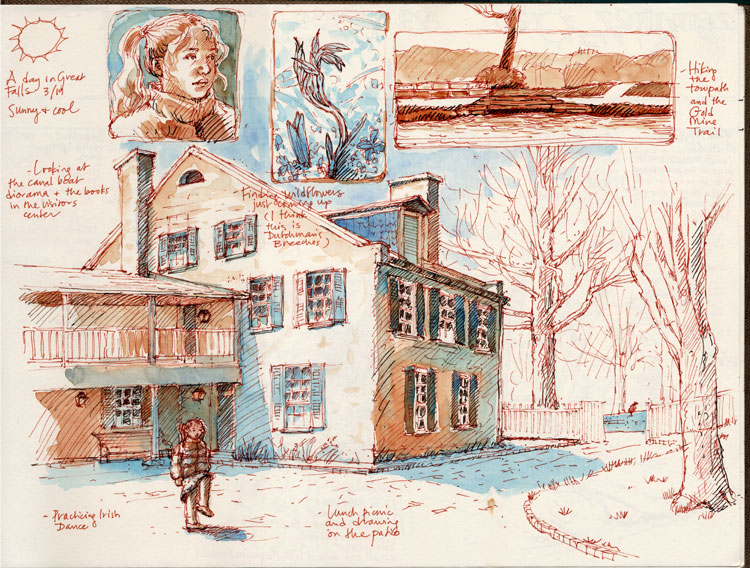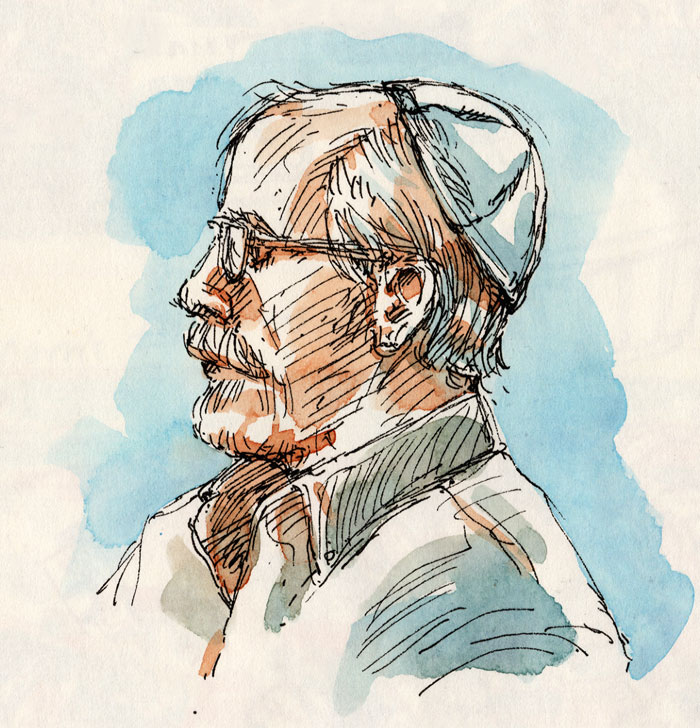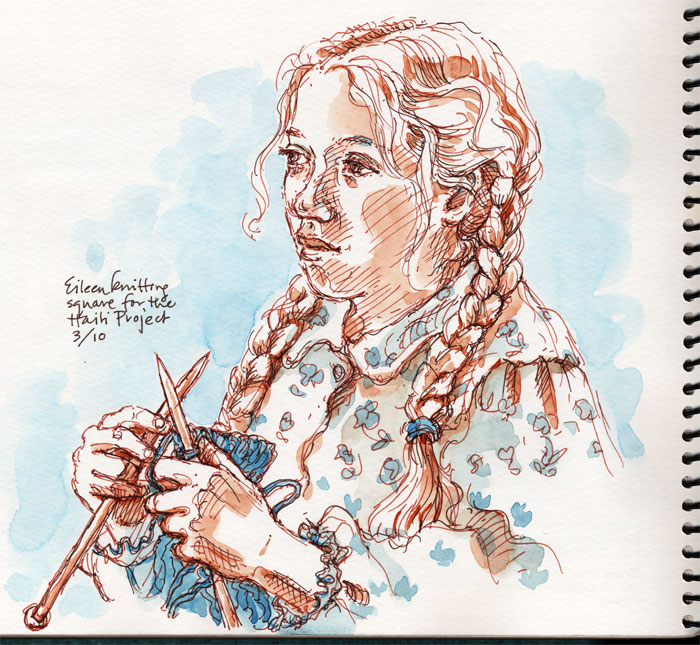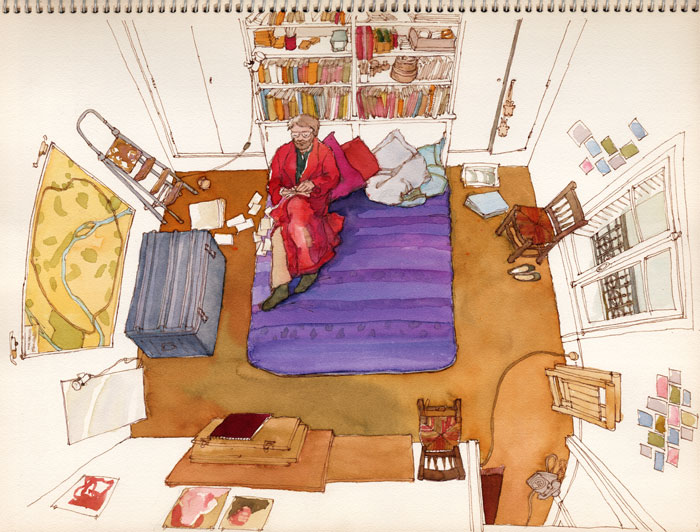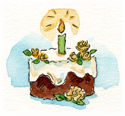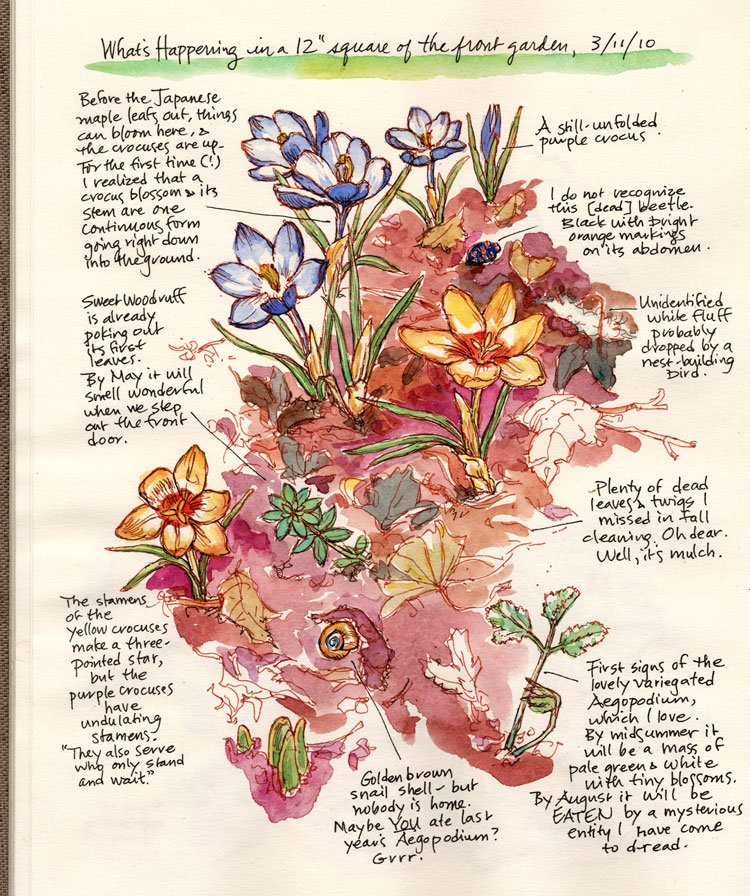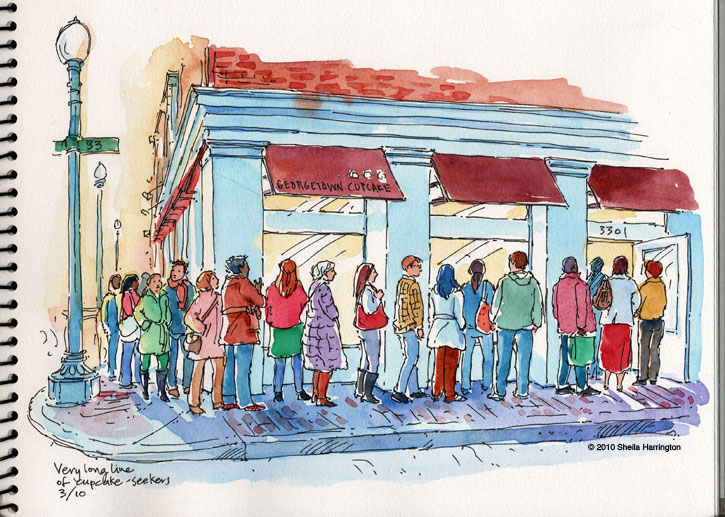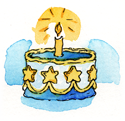Each year Discovery Theater at the Smithsonian offers a performance in celebration of spring festivals in various cultures. My daughter and I attended as part of a homeschoolers’ outing, and I took along my sketchbook. The homages to the season were skillfully woven together with music, dancing, brief dramatic episodes, and rapid costume and prop changes by the very small yet impressive multi-talented cast. It was lively and engaging, but really tough to sketch and make notes! More like a series of scrawls. Since these fill a spread of my sketchbook, it’s too big for one post, so just the left side today: Passover, the Maypole, and Hana Matsuri.
Category: Sketchbook
C&O Canal
From my sketchbook, in the spring a couple of years ago. We took a break from lessons in the middle of the week to walk along the C&O Canal, look at emerging wildflowers, visit the small history exhibit in the Great Falls Tavern Visitors Center, and have a picnic lunch in its garden. One of the many advantages of homeschooling.
Spring Cleaning
I’m sorry; it’s not what you hoped—that is, if you were hoping for tips on getting your life and your environment organized. (Actually I came across a really useful blog for that the other day, though; Totally Together Journal.) No, this is the City of Washington, DC doing its river-tidying, which my daughter and I discovered by accident. Did you ever wonder what happens to the logs and branches that tumble into the Potomac River upstream whenever there is a hearty spring rainstorm? Well, a tugboat glides up and down the river gathering them in its little metal arms and transfers them to a barge for removal. So they don’t bash into you when you are out in your Thompson’s or Fletcher’s rental canoe. Your DC taxes at work.
i carry your heart with me
My dear husband, celebrating Passover a couple of years ago with friends. I chose this picture from my sketchbook because we are once again entering the season. And also because I think he looks really good in a yarmulke. (I hope that’s not sacrilegious.) He was diagnosed with a heart condition since then and yesterday suffered an episode that sent us to the ER for most of the day. He’s in the hospital now, under observation on a new medication. Please send your kind healing thoughts his way.
i carry your heart with me(i carry it in
my heart)i am never without it(anywhere
i go you go,my dear; and whatever is done
by only me is your doing,my darling)
i fear
no fate(for you are my fate,my sweet)i want
no world(for beautiful you are my world,my true)
and it’s you are whatever a moon has always meant
and whatever a sun will always sing is you
here is the deepest secret nobody knows
(here is the root of the root and the bud of the bud
and the sky of the sky of a tree called life;which grows
higher than the soul can hope or mind can hide)
and this is the wonder that’s keeping the stars apart
i carry your heart(i carry it in my heart)
—e.e. cummings
Loveliest of Trees
Every year about now I start muttering this poem to myself. And I ponder how suitable it was that its author, Alfred Edward Housman (1859-1936), was born on this day, in the season of the lovely, evanescent, and melancholy cherry blossom.
Housman was one of seven children of a rather depressed solicitor in Fockburg, England who had a tendency to invest heavily in failed inventions. No wonder he was depressed. Housman’s health was frail, and in school he was subject to bullying. As many were, in pretty much any fine olde boys’ public school. His beloved mother’s death when he was twelve was a severe blow. However, as a student he showed great promise, and he won a scholarship to Oxford, where he took up classics.
Although he was brilliant, Housman was unwilling to expend much energy on what didn’t interest him, and he much preferred his studies of the Latin poets to philosophy and ancient history. He failed to pass his final exams, and there is speculation that the cause was not only neglect of his studies but also the disappointing (and lifelong) attachment he had developed to his school roommate, Moses Jackson, which never went beyond friendship (Jackson being heterosexual).
Housman’s failure to pass his studies made it impossible to enter a position in academia, but Jackson, who couldn’t give him True Love, obtained for Housman through his connections the next best thing—a Steady Government Job. (And that sounds really attractive in the current economy.) So for the next ten years Housman was a London Patent Office Clerk by day and classical scholar by night, studying Greek and Roman classics independently and writing articles for learned journals, gradually gaining an impressive reputation that led to a professorship in Latin, first at University College, London, and then Cambridge University, where he eventually published several volumes of his meticulous textual analysis and translation.
But do we remember Housman for his brilliant Latin scholarship? No, we do not. Unless we are brilliant Latin scholars ourselves. No, this clerk by day and scholar by night was somehow finding the time to write evocative lyrical poetry. In 1896 he assembled a collection of 63 of his poems and went looking for a publisher. After being rejected by several, he decided to publish the collection, titled A Shropshire Lad, at his own expense, surprising his colleagues, who evidently had had no idea of Housman’s other interest. The book sold slowly at first, but as musicians set some of his ballad-like poems to music, its reputation grew, and with the advent of the First World War, his themes of death and loss struck a chord in the public. It became one of the most popular volumes of serious poetry ever published.
Apparently an aloof, intimidating professor with a sarcastic wit, Housman was not an easy companion, and when Jackson married, he did not even send Housman word. Housman gradually became increasingly reclusive. But when Jackson was gravely ill in Canada, Housman decided to assemble his unpublished poems so that his old friend could read them before he died. These were published as Last Poems in 1922, 36 years after A Shropshire Lad. One more collection was published posthumously.
And that’s it. What Housman created as a sideline (“I am not a poet by trade; I am a professor of Latin”) has become an inextricable and unforgettable component of the body of English poetry. Housman said once, “The emotional part of my life was over when I was thirty-five years old.” Yet his poetry, at once spare and vivid, is imbued with feeling, without being sentimental. What he did not permit himself in life he has given us on the page.
So go for a walk under the pink and drifting petals, and wish Alfred Housman a Happy Birthday.
Bugs for Breakfast
I was sitting in the garden sketching plants when I became aware of a persistent rat-tat…rat-tat-tat…rat-tat… I finally looked up, and there on the tree trunk a few feet away was a female (no red patch on the head) downy woodpecker pecking for her breakfast. I had been sitting so still that she hadn’t paid attention to me. So I ve-e-e-ry slowly turned the page in my sketchbook and drew her instead.
Knitting/Dreaming
Here is my daughter knitting a square for the Haiti project, for which you can see yesterday’s post or download the flyer here.
If she looks a little dreamy-eyed, it’s because we are also watching Walt Disney’s Cinderella, made in 1950. My, the animation is impressive, considering it was hand-drawn and painted frame by frame with no computer assistance! Go watch again the scene where Cinderella scrubs the floor, her image reflected in dozens of lovely floating multicolored soap bubbles.
Paris Memory
This rather yellowed sketch is from a previous lifetime when my husband and I were first married and living in Paris, drawing, painting, sculpting. Before children. Before we became rather yellowed ourselves. I chose this particular walk down la rue des souvenirs, when we were temporary expatriates, in honor of Sylvia Beach (1887-1962), whose birthday it is today.
Beach was born in Baltimore, Maryland, and was actually christened Nancy, but she later changed it to a name she chose herself. There were generations of clergy and missionaries on both sides of her family, but Beach chose literary passion and Francophilia over religious fervor. Definitely similarities there though.
Perhaps she became a Francophile during her father’s assignment to the American Church in Paris when she was fourteen, because she returned to Paris later to pursue studies in French literature, and stayed for the rest of her life. Her research led her to a meeting, collaboration, and romance with Adrienne Monnier, who had in 1915 opened a bookshop-cum-lending library specializing in French translations of modern works. By 1921 Beach’s own shop, Shakespeare and Company, was installed across the street at 12, rue de l’Odéon, in the Latin Quarter, offering classical and modern literature and periodicals in English and English translations.
Shakespeare and Company quickly became one of the centers of the Paris literary world, with authors, poets, and readers wandering back and forth across the street between the two complementary shops (imagine!) to engage in discussion, exchange news, and borrow money (struggling writers being ever short-handed). But she was far more than a seller of books. Kind, cheerful, enthusiastic, and generous as well as learned, she took it upon herself to help aspiring writers succeed, introducing them to one another and to helpful contacts, taking them round to visit Gertrude Stein’s salon of poets and artists, organizing readings to bring their works before the public. She helped James Joyce and Henry Miller find publishers for their work, which was banned and unprintable in their native countries.
When the Germans invaded Paris in 1939, Beach was forced to close her shop and spent six months in an internment camp, afterwards hiding out with a friend (she was after all an enemy American) until the war’s end. The shop never reopened after the war, but a new version was launched in 1951 under the same name, with Beach’s permission, on rue de la Bûcherie (about which more in a later post).
Pretend you are a young, aspiring American writer on your first visit to Paris. Back on the farm they think you’re crazy. You wander into Shakespeare and Company and encounter Ernest Hemingway… F. Scott Fitzgerald… Ezra Pound. Miss Beach ropes you in to help edit press proofs. In the afternoon she takes you to the Steins’ to see the new work of Pablo Picasso and Henri Matisse and in the evening to admire Josephine Baker dancing at the Théatre des Champs-Elysées. Paris in the 1920s was a refuge from Puritanism, Prohibition, and Prejudice, and Sylvia Beach did her part to make it so. Happy Birthday, Patron Saint of the Independent Booksellers.
Twelve Inches of Spring
Cupcake Fever
Georgetown Cupcake often has a line out the door, but Sunday afternoon it was amazingly long, and customers were carting away cupcakes by the dozens. People were either stocking up on a supply to get them through the Oscars later that evening, or, with the approach of spring, planning to consume as many as possible while winter coats still disguise the results.

